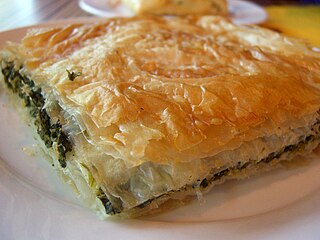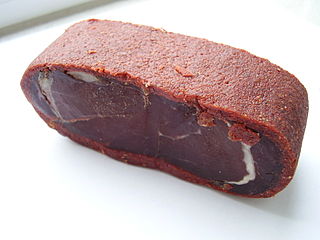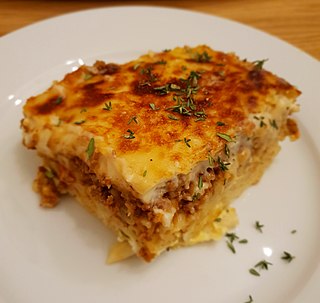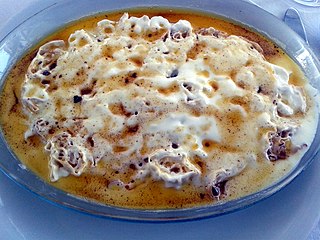
Turkish cuisine is the cuisine of Turkey and the Turkish diaspora. The cuisine took its current form after numerous cultural interactions throughout centuries, descending from earlier stages of Turkish cuisine, Ottoman cuisine and Seljuk cuisine. Turkish cuisine with traditional Turkic elements such as yogurt, ayran, kaymak, exerts and gains influences to and from Mediterranean, Balkan, Middle Eastern, Central Asian and Eastern European cuisines.

Savory spinach pie is a pastry eaten throughout the Southeastern Europe. The filling is made of chopped spinach and usually feta or white cheese, and egg.

Pastirma or Pasterma, also called pastarma, pastırma, pastrma, pastourma, basdirma, basterma, basturma, or aboukh is a highly seasoned, air-dried cured beef that is found in the cuisines of Albania, Armenia, Bosnia and Herzegovina, Romania, Bulgaria, Egypt, Greece, Cyprus, Iraq, the Levant, North Macedonia, Azerbaijan, and Turkey.

Pastitsio is a Greek baked pasta dish with ground meat and béchamel sauce, with variations of the dish found in other countries near the Mediterranean Sea.

Galaktoboureko is a Greek, Turkish, Albanian, Laz, and Syrian dessert of custard baked in filo. Lazi Laz böreği is made with a type of pudding called muhallebi instead of semolina custard. It is popular In the Rize and Artvin provinces in Turkey's Black Sea Region, indigenous home of Laz people. In Albania it's a dessert traditionally prepared during the Orthodox Easter.

Ayran is a cold savory yogurt-based beverage that is consumed across Central Asia, and the Balkans. It is very popular in Turkey and Iran. The principal ingredients are yogurt, water and salt. Herbs such as mint may be optionally added. Some varieties are carbonated.

Börek or burek is a family of pastries or pies found in Ottoman cuisine. The pastry is made of a thin flaky dough such as filo with a variety of fillings, such as meat, cheese, spinach, or potatoes. A borek may be prepared in a large pan and cut into portions after baking, or as individual pastries. They are usually baked but some varieties can be fried. Borek is sometimes sprinkled with sesame or nigella seeds, and it can be served hot or cold.

Manti is a type of dumpling mainly found in Turkish cuisine, Armenian cuisine and Central Asian cuisine but also in West Asia, South Caucasus, and the Balkans. Manti is also popular among Chinese Muslims, and it is consumed throughout post-Soviet countries, where the dish spread from the Central Asian republics. The dumplings typically consist of a spiced meat mixture, usually lamb or ground beef, wrapped in a thin dough sheet which is then boiled or steamed. The size and shape of manti vary significantly depending on geographic location.

Çoban salatası or choban salad is a salad that originated from Turkish cuisine and Azerbaijani cuisine consisting of finely chopped tomatoes, cucumbers, long green peppers, onion, and flat-leaf parsley. The dressing consists of lemon juice, olive oil, and salt.

Bořek Dočkal is a Czech former professional footballer who played as a midfielder and captained Sparta Prague. Outside of his native Czech Republic, he played club football in Turkey, Norway, China, and the United States. Dočkal represented Czech Republic at international level, serving as captain at both youth and senior levels.

Beyaz peynir is a brine cheese produced from unpasteurized sheep, cow or goat milk. The cheese has a slightly grainy appearance and is similar to lighvan, feta, sirene and other Balkan white cheeses. Vegetable rennet is added to the sheep's milk as a clotting agent. Once the curds are produced, they are pressed, chopped, and strained before being cut into blocks that are salted and placed in a brine solution for approximately six months.

Cheburek are deep-fried turnovers with a filling of ground or minced meat and onions. A popular street dish, they are made with a single round piece of dough folded over the filling in a crescent shape. They have become widespread in the former Soviet-aligned countries of Eastern Europe in the 20th century.

Sarburma, also known simply as burma among Crimean Tatars and as pierekaczewnik among Lipka Tatars, is a traditional meat pie in Crimean Tatar cuisine. In Crimean Tatar language sarmaq means "to wrap" and burmaq "to curl". Its name among Lipka Tatars come from the Russian verb перека́тывать “to roll up.” Nowadays, it is a widespread snack in Crimea, neighbouring regions of Ukraine, and in Turkey. In Poland it is a distinctive cuisine of the Lipka Tatars, and is registered under the name pierekaczewnik in the European Union and United Kingdom as a Traditional Speciality Guaranteed. The main ingredients are traditionally lamb and dough. The same are used in another very popular Crimean and Turkish dish, çibereks.

Borș de burechiușe or borș de burechițe is a Romanian and Moldovan dish specific from the regional cuisine of Moldavia and of Bukovina. Burechiușe or gălușcă also known as urechiușe is a dough in the shape of a ravioli-like square which is filled with mushrooms such as boletus edulis, and sealed around its edges and then tossed and subsequently boiled in a ciorbă. The borș de burechiușe are traditionally eaten in the last day of fasting at the time of the Christmas Eve.

A leek is a vegetable, a cultivar of Allium ampeloprasum, the broadleaf wild leek. The edible part of the plant is a bundle of leaf sheaths that is sometimes erroneously called a stem or stalk. The genus Allium also contains the onion, garlic, shallot, scallion, chives, and Chinese onion. Three closely related vegetables, elephant garlic, kurrat and Persian leek or tareh, are also cultivars of A. ampeloprasum, although different in their culinary uses.
Tatar böreği is a Turkish food consisting of dough parcels usually cut in the form of a triangle. It is a common food in many inner regions of Turkey in cities like Eskişehir and Gaziantep.
Kabaklı peynirli börek is a savory Turkish börek made from phyllo and stuffed with a filling made primarily of zucchini and beyaz peynir. Its name is a compound word which derives from "kabak" and "börek".
Puf Böreği is a deep-fried turnover with a filling of ground or minced meat and onions or Turkish cheese and parsley, dill.

Siron, Ziron, Sinor or Silor is a pasta dish made with yufka, salty yoghurt, butter and garlic. Its name varies from city to city, from region to region. It is shared by Laz people, Pontic Greeks, and Turks.
Bulemas or boulemas, also rodanches or burmaikos, are a traditional baked pastry in Sephardic Jewish cuisine. They are made from a yeast dough that is thinly stretched and filled with a savory mixture, and then rolled into a spiral shape. Once baked, the pastry boasts a delicate and flaky texture akin to that of phyllo-based pastries, like the Turkish Kol böreği and the Greek spanakopita.


















